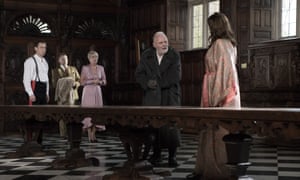Most Shakespeare productions on television have been either camera-captures of a previous theatre success or were filmed in a studio that looked like a stage. Sir Anthony Hopkins’ King Lear, though, is, in every sense, specially made for television.
The actor retired from theatre in 1989, stultified by nightly repetition, and so this Lear – played at 80, the precise age the play suggests the title character to be – was unavailable to even the world’s richest and most pleading playhouses. As when Laurence Olivier, too frail for stage, recorded the part for Channel 4 in 1983, TV has given to posterity a theatrical impossibility.
Nor would any West End producer be likely to persuade Emma Thompson to play Goneril, one of the daughters the English king disinherits on his route through wilfulness to wisdom, or Jim Broadbent to portray the Earl of Gloucester, whose eyes are ripped out in the most brutal representation of the play’s driving metaphor of failure to see what matters.
But, in another crucial way as well, this version is purely televisual. The play, if performed in full, runs for at least four hours, but director Richard Eyre brings it in at 115 minutes, the average span of a movie thriller, a genre also echoed through the setting of a dystopian contemporary London under Lear’s military dictatorship.
This length and look are central to the show’s ambitions. Most TV Shakespeare has been aimed at viewers who happened not to be at the National Theatre or RSC on that night. With this version, the BBC and co-producers Amazon – in whose online vaults the show will have a long afterlife beyond its BBC Two premiere on Monday – hope that audiences who have watched Hopkins in Westworld will give it a go, as might those who admired Jim Carter (the Earl of Kent) as the butler in Downton Abbey, or Andrew Scott (Gloucester’s banished son, Edgar) as Moriarty in Sherlock.
In style, as well as cast, the show fits TV’s flow. The pivotal scene in which Lear loses his mind, usually located on a heath, here takes place in a bleak concrete shopping centre that was modernist long ago, with Hopkins, like a street-sleeper, wheeling a supermarket trolley though the winos and school truants.

Where that image extends the medium’s long line of post-apocalyptic Britains, Gloucester’s blinding alludes to horror fiction, with the violent loss of sight chillingly suggested by spatters of blood hitting the earl’s now useless spectacles on the table where his torturers have placed them. The battle scenes, with the skies billowing smoke and the ground running blood, are as Shakespeare would have written them if he had seen Game of Thrones.
Another hero of the show is the delete key on the director’s laptop. Swathes of pages are excised, especially in the sub-plots of the middle acts, with the sequencing also tweaked, so that the second scene of the fourth act now comes after the sixth, which is joined to the first. Counter-intuitively, but effectively, Eyre often ignores Shakespeare’s use of cross-cut short scenes, prophetic of cinema, to create longer sections in one setting.
The most ferocious but intelligent surgery has been done to the theatrically lengthy central section in which Lear first rages in a storm and then shelters in a hovel where he conducts a mock-trial of his daughters. This is where, even in the best stagings, the audience starts visualising the interval ice-creams, but thoughtful cutting, as throughout, emphasise the play’s essential patterns of language (the word “nothing” tolling like a funeral peal from scene to scene) and the paralleled encounters between Lear and his daughters and Gloucester and his sons, representing differently blinkered parenting.
As in the BBC Shakespeare history-play mash-up The Hollow Crown, on which Eyre worked, cutaways economically establish who is being discussed, and what they feel. In a way impossible on stage, some of Lear’s words and actions are dramatised through the reactions of his family.
The main point of the project, though, is to the return to the classical canon of Hopkins, a potentially great Shakespearean actor lost first to alcoholism and then Hollywood, but who proves that he still has the vocal dexterity and psychological intuition for the repertoire’s peaks.
As has become common with modern Lears, he gives a clinically precise depiction of the onset of dementia, with which we now diagnose the king. But the key to his wrenchingly affecting performance is a bold verbal bi-polarity: much must have been done in the sound balance to reconcile the flaming rage of the early curse against Cordelia (“Better that she had not been born”) with the whispery softness of his the reconciliation: “We too alone will sing like birds i’ the cage.”
Thompson’s grey-haired, twist-mouthed Goneril – first hungry for power and then poisoned by it – suggests that she would be ideal casting for Theresa May: The Movie. Broadbent, an actor of impeccable vocal clarity, ensures that even the most reluctant viewer will understand exactly what his Gloucester, a pedantic palace lackey who might be the wiser brother of Polonius in Hamlet, is saying.
Showing that fidelity to a text and respect for it are different things, this thrilling reimagining could not have done more to make a 412-year-old tragedy thrive in the box-set and streaming culture.
King Lear is on BBC Two tonight at 9.30p on BBC Two and will be available on Amazon